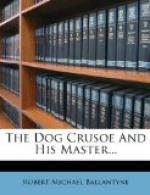“Any way you like.”
“You forgot your belt at starting, I think I heerd ye say.”
“Yes, I did,” replied the trader, smiling.
Dick immediately took hold of Cameron’s coat, and bade Crusoe smell it, which the dog did very carefully. Then he showed him his own belt and said, “Go back to the camp and fetch it, pup.”
Crusoe was off in a moment, and in less than twenty minutes returned with Cameron’s belt in his mouth.
“Well, I’ll trust him,” said Cameron, patting Crusoe’s head. “Forward, lads!” and away they went at a brisk trot along the bottom of a beautiful valley on each side of which the mountains towered in dark masses. Soon the moon rose and afforded light sufficient to enable them to travel all night in the track of the Indian hunter who said he had seen the Peigans, and who was constituted guide to the party. Hour after hour the horsemen pressed on without check, now galloping over a level plain, now bounding by the banks of a rivulet, or bending their heads to escape the boughs of overhanging trees, and anon toiling slowly up among the rocks of some narrow defile. At last the moon set, and the order was given to halt in a little plain where there were wood and water.
The horses were picketed, a fire kindled, a mouthful of dried meat hastily eaten, the watch was set, and then each man scraped away the snow, spread some branches on the ground, and wrapping himself in his blanket, went to sleep with his feet presented towards the fire.
Two hours were allowed for rest; then they were awakened, and in a few minutes were off again by the gray light of dawn. In this way they travelled two nights and a day. At the end of that time they came suddenly on a small party of nine Indians, who were seated on the ground with their snow-shoes and blankets by their sides. They had evidently been taken by surprise, but they made no attempt to escape, knowing that it was useless. Each sat still with his bow and arrows between his legs on the ground ready for instant use.
As soon as Cameron spoke, however, in their own language they felt relieved, and began to talk.
“Where do you come from, and what are you doing here?” asked the trader.
“We have come to trade with the white men,” one of them replied, “and to hunt. We have come from the Missouri. Our country is far away.”
“Do Peigans hunt with war-arrows?” asked Cameron, pointing to their weapons.
This question seemed to perplex them, for they saw that their interrogator knew the difference between a war and a hunting arrow—the former being barbed in order to render its extraction from the wound difficult, while the head of the latter is round, and can be drawn out of game that has been killed, and used again.
“And do Peigans,” continued Cameron, “come from a far country to trade with the white men with nothing?”
Again the Indians were silent, for they had not an article to trade about them.




